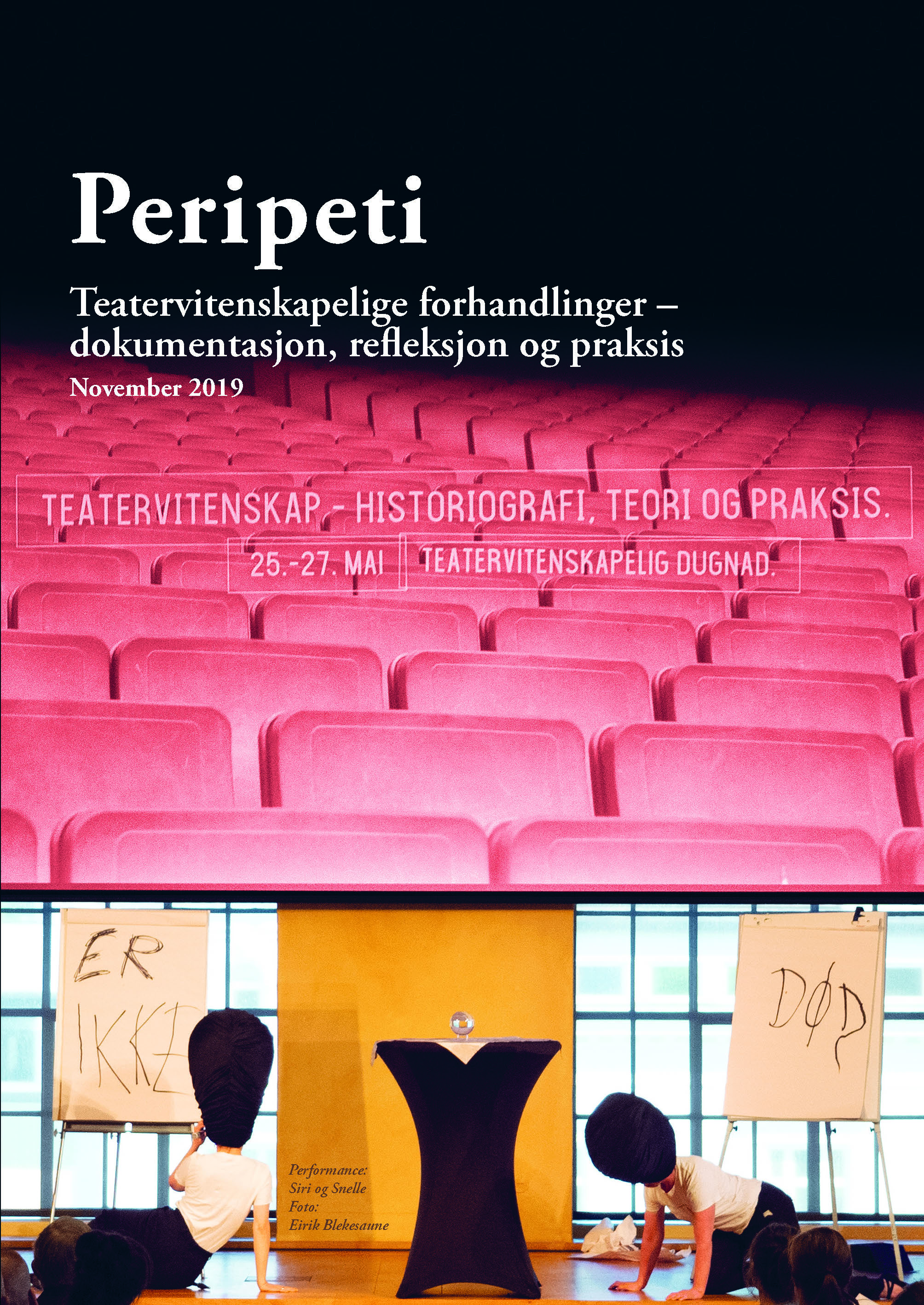Klasserommet som Agora – et reelt demokratisk rom?
DOI:
https://doi.org/10.7146/peri.v16iS8.117596Nøgleord:
Klasserommet, dramapraksis, demokrati, Rancière, Agora, Classroom, drama practice, democracyResumé
I artikkelen undersøker vi hvorvidt en spesifikk dramapraksis kan bidra til å styrke klasserommets potensial som demokratisk arena. Diskusjonen knytter an til Rancières politiske estetikk, og begrepet om Agora i radikal pedagogisk forstand. Vi finner tegn på at fasilitert dramapraksis med grader av elevselvstyring i klasserommet kan re-etablere en læringskultur nært et ideal om klasserommet som «agora», og dermed bli en del av det reelle politiske demokrati.
In this article, we examine whether a specific drama practice can help strengthen the classroom’s potential as a democratic arena. The discussion relates to Rancière’s political aesthetics, and the concept of Agora in a radical educational sense. We find that facilitated drama practice with degrees of pupils’ self-management in the classroom can re-establish a learning culture close to an ideal of school and classroom as part of a real political democracy.
Referencer
Crouch, C. (2014). Putting neoliberalism in its place. The Political Quarterly. 85, 114–121.
Govan, E, Nicholson, H, Normington, K. (2007). Making a performance: Devising histories and contemporary practices, Oxon, UK: Routledge.
Hallward, P. (2006). Staging equality: on Ranciere’s theatrocracy. New Left Review, 109–129.
Haseman, B., & Rasmussen, B. (2010). Researching the Possibilities for Knowing in Process Drama, i J. Shu & P. Chan (Red.), Planting Trees of Drama with Global Vision in Local Knowledge: the IDEA 2007 Dialogues. 478–489: Hong Kong Drama/Theatre and Education Forum (TEFO), IDEA publications.
Heddon, D. & Milling, J. (2006). Devising Performance – a critical history, Palgrave Macmillan, New York.
Heggstad, K.M. (2012). Å fastholde det flyktige – videoobservasjon I drama/teaterforskning, i Gjærum, R. G. & Rasmussen, B. (red). Forestilling, framføring, forskning. Metodologi i anvendt teaterforskning. (s. 231–247). Trondheim: Akademika forlag.
Margus, V. (2018). Everyday aesthetics and Jacques Rancière: reconfiguring the common field of aesthetics and politics, Journal of Aesthetics & Culture, 10:1, DOI: https://doi.org/10.1080/20004214.2018.1506209
Mark, J.J. (2009). Agora. Ancient History Encyclopedia, http://www.ancient.eu/agora/
Mouffe, C. (2000). The Democratic Paradox. London; Verso.
Nowotny, H. (2003). Dilemma of experise. Democratising expertise and socially robust knowledge. Science and Public Policy, volume 30, number 3, June 2003, 151–156, Beech tree Publishing, 10 Watford Close, Guildford, Surrey GUI 2EP, England.
Oddey, A. (1994). Devising Theatre. A practical and theoretical handbook. London: Routledge.
Overordnet del – verdier og prinsipper for grunnopplæringen» (2017) https://www.regjeringen.no/contentassets/37f2f7e1850046a0a3f676fd45851384/overordnet-del---verdier-og-prinsipper-for-grunnopplaringen.pdf
Pell, J. & Duffy, W. (2015). Freire in the Agora: Critical Pedagogy and Civil Discourse.
Literacy in Composition Studies, 3(1), 95–107, https://doi.org/10.21623/1.3.1.8
Rancière, J. (2006). Hatred of Democracy, London, Verso.
Rancière, J. & Corcoran, S. (2010). Dissensus: on Politics and Aesthetics, London, Continuum.
Rancière, J. (2011). The Thinking of Dissensus: Politics and Aesthetics, i Paul Bowman & Richard Stamps (Red) Reading Rancière, Continuum, Londres: N.York, 2011, 1–17.
Rancière, J. & Rockhill, G. (2013). The Politics of Aesthetics, London, Bloomsbury Academic.
Rasmussen, B. (2010). The good enough drama. Reinterpreting constructivist aesthetics and epistemology in drama education. Research in Drama Education, 5(4), 529–546.
Rehm, R. (2002). The Play of Space: Spatial Transformation in Greek Tragedy, Princeton University Press.
Stray, J.H. (2014). Skolens demokratimandat, i Stray, J.H. og Wittek, L. (Red), (2014) Pedagogikk – en grunnbok. (s.651–664). Oslo: Cappelen Damm Akademisk.
Swyngedouw, E. (2011). Interrogating post-democratization: Reclaiming egalitarian political spaces. Political Geography, 30, 370–380.
Øfsti, R. (2014). Rommet og undervisninga – læraren som scenograf. I, Østern, A-L. (red). Dramaturgi i didaktisk kontekst, (s. 87–119), Fagbokforlaget Vigmostad & Bjørke AS, Trondheim.
Downloads
Publiceret
Citation/Eksport
Nummer
Sektion
Licens
Det følgende vedrører alle Peripeti-udgivelser fra 2024, nr. 39, og senere:
Peripeti er et Diamond Open Access-tidsskrift, der giver direkte open acces til publiceret indhold ud fra princippet om, at det at gøre forskning frit tilgængelig for offentligheden understøtter en større global udveksling af viden.
Forfattere skal ikke betale for indsendelse, redigering eller offentliggørelse af artikler.
Forfattere, der bidrager til Peripeti, bevarer ophavsretten til deres artikler.
Forfattere accepterer at udgive artikler under en Creative Commons CC-BY-NC 4.0-licens. Vilkårene for denne licens tillader brugere frit at kopiere og videredistribuere materialet i ethvert medie eller format og at tilpasse, transformere og bygge videre på materialet, så længe der gives passende kreditering, et link til licensen gives, og eventuelle ændringer angives. Brugere må ikke dele eller tilpasse materialet til kommercielle formål uden samtykke fra licensgiveren. Brugen af licensen må ikke på nogen måde antyde, at licensgiveren støtter tredjeparten eller dennes brug. Licensen kan ikke tilbagekaldes.
Forfattere opfordres til at lægge deres artikler ud på personlige og/eller institutionelle hjemmesider for at sikre endnu større offentlig adgang efter udgivelsen. Forfattere har ret til at arkivere deres artikler i fondes og offentlige institutioners arkiver, men Peripeti anmoder om, at forfattere bruger et direkte link til den publicerede artikel på tidsskriftets hjemmeside, når det er muligt, da Peripeti som en ikke-kommerciel, offentligt finansieret udgiver er afhængig af niveauet af brugeraktivitet på tidsskriftets hjemmeside.
Vedrørende tidligere udgivelser, indtil 2024, herunder nr. 38:
Ophavsretten deles mellem Peripeti og forfatteren/forfatterne. Tidsskriftet er et open access-tidsskrift, der giver direkte adgang til alt indhold baseret på princippet om, at det at gøre forskning frit tilgængelig for offentligheden understøtter en større global udveksling af viden. Brugere kan frit kopiere og dele materiale i ethvert medie eller format, så længe der gives passende kreditering. Enhver anden brug kræver skriftligt samtykke fra indehaverne af ophavsretten.





